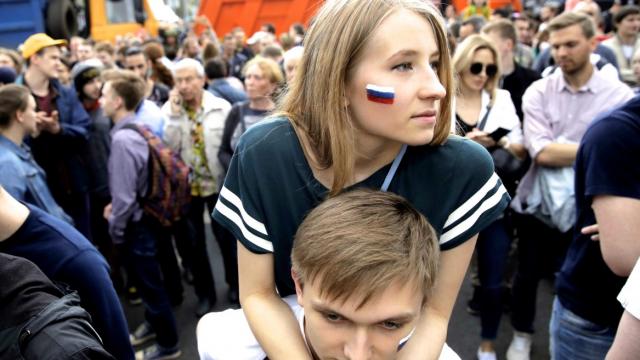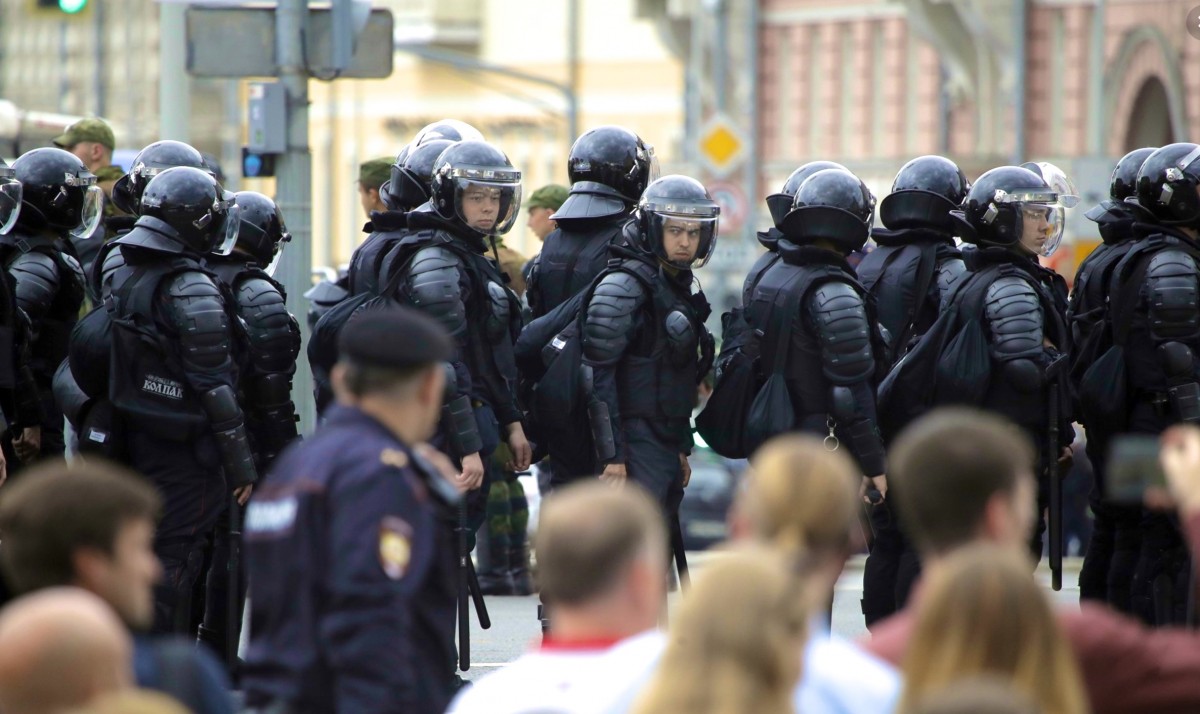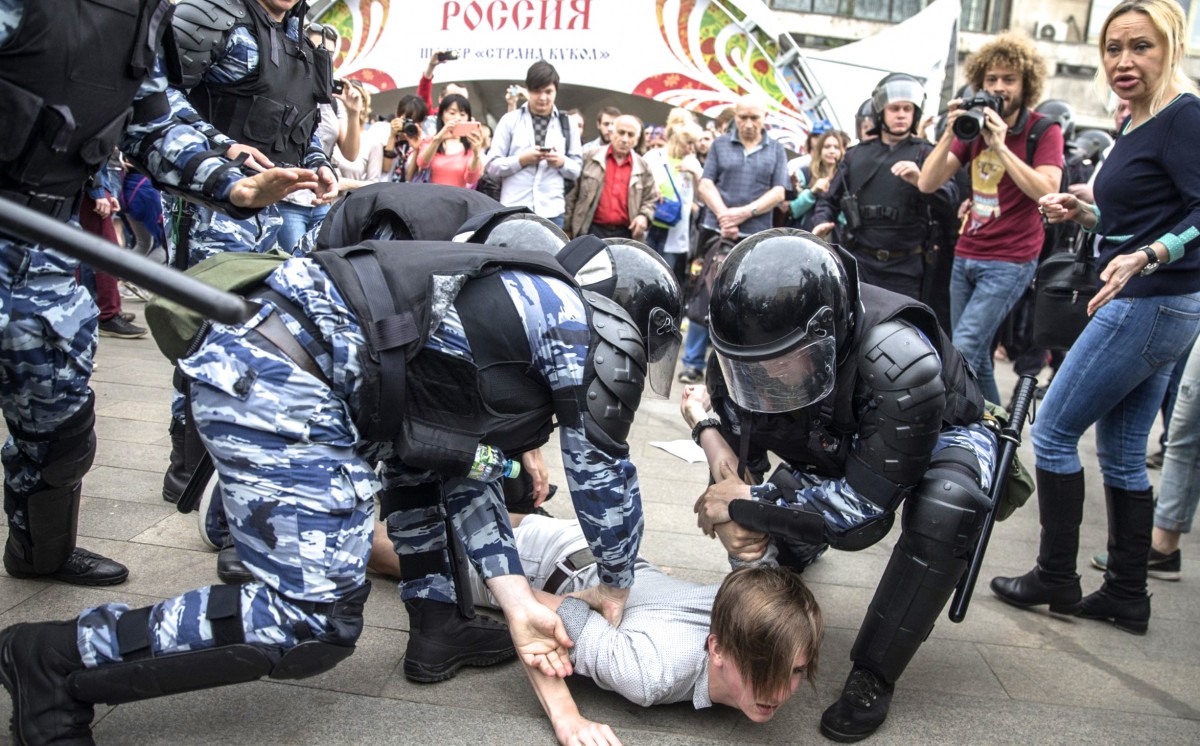
MOSCOW — Shouting “We demand answers,” and “Stop lying and stealing,” tens of thousands of protesters turned out Monday across Russia in a nationwide anti-corruption rally called by opposition leader Alexei Navalny as part of his long-shot bid to unseat President Vladimir Putin.
Navalny was arrested and sentenced to 15 days in jail for his role in organizing an illegal protest.
Protests in more than 180 cities gave a clear sign of growing support for the anti-graft message of Navalny’s campaign. But police detained Navalny at his home after he defied authorities by calling on his followers to gather on Moscow’s central thoroughfare instead of an approved protest space north of the center.
“Alexei told me to pass on to us that the plan hasn’t changed,” Navalny’s wife, Yulia Navalnaya, tweeted after her husband’s detention. She told protesters to head to central Tverskaya Street despite a warning by Moscow authorities that a demonstration there was illegal.
Police blocked off the thoroughfare, but several thousand demonstrators, many of them in their teens and 20s, tried to hold a rally. By 4 p.m. in Moscow, riot police squads were wading into the crowd, dragging and carrying out protesters by their arms and legs and beating them with batons, as the demonstrators shouted “Shame!” Several protesters fought back, trading punches and kicks with officers before being dragged off.
News agencies reported that police detained 400 people in Moscow and scores of others at a rally in St. Petersburg that was held despite authorities’ refusal to grant approval.
Navalny called Monday’s rally after tens of thousands turned out across Russia on March 26 for an “anti-corruption” protest in the wake of his allegations that Prime Minister Dmitry Medvedev has amassed vineyards, luxury yachts and lavish mansions worth more than $1 billion.
The Kremlin was clearly caught off guard by the turnout in March, especially among young people. Authorities made a show of arresting people involved in the protest, and educators forced students to watch documentaries about the evils of protesting. Some Russian parliament members expressed support for a ban against minors attending street rallies.
This time, in Moscow, authorities were ready. As many as 2,000 helmeted police stood guard outside Tverskaya Street, which was closed to traffic for historical reenactments.
The result was a surreal scene in which 17th-century fencers feinted and darted to wild applause from children, while men with prominent bellies and small purses crowded around the reenactment of a 14th-century battle between ancient Russians and the Golden Horde. Tverskaya was crammed with military reenactors in model forts and bivouacs, ending at sandbag fortifications and tank traps by the Kremlin.
“Tverskaya is ready for Navalny,” the newspaper Vedemosti tweeted, noting the sandbags and tank traps in place for a reenactment of World War I.
The protest coincided with Russia Day, the commemoration of Russian leader Boris Yeltsin’s declaration of Russian sovereignty within the former Soviet Union in 1990.
Russian state television focused on the fairs and commemorative events, which attracted tens of thousands in Moscow alone, rather than on the street protests. It ran a live broadcast of Putin handing out state awards, and periodically showed a countdown to the Kremlin leader’s annual televised “direct line” Thursday, in which ordinary citizens can phone in requests.
The protest presented a challenge to Putin, who made a point of pledging that Russian police would avoid the use of force. He made the statement in an interview this month with NBC’s Megyn Kelly that was reprinted on the Kremlin website.
Russian authorities, through state media, have cast Navalny as a stooge of Western elites who has no plans for how he would lead the country and who produces slanderous videos to grab attention. When authorities do mention Navalny, it is to remind television viewers that he has been twice convicted of fraud. He has denounced the cases as political. The result has been to officially disqualify him from running for president in 2018.
Monday’s rally was a test for Navalny to see if people would turn out despite authorities repeated warnings.
“I’m angry, my family is angry, but they’re not going to come to this because they’re scared,” said Alexander Fomenko, 17-year-old student wearing jean shorts, closely cropped hair and a tattoo with a dragon on his left leg. "I don't have such fear. I will be here on this street until they throw me in jail. And there's a lot of people who think like me; my friends think like me."
Coordinated rallies called by Navalny attracted large crowds in cities across Russia. Between 2,500 and 5,000 rallied in the major Siberian city Novosibirsk, according to the Ekho Moskvy radio station, citing police and unofficial sources. Other major cities saw large turnouts despite official efforts to minimize crowds. (In one city, protesters were ordered 50 miles from the city; in another, a crowd gathered at 7 a.m., the time authorities approved.)
At the venue in Moscow originally approved for Navalny’s protest, a smaller group gathered Monday to protest city’s plan to relocate as many as 1.6 million residents of Soviet-era low-rise apartment buildings to new high-rise apartment buildings. Some Muscovites believe the plan amounts to a violation of their rights to own property and to choose where to live, and a gift to political insiders who own construction firms.
"I don't want to live in a 30-floor ant-house. Their whole project is total corruption, money laundry, initiated by the construction lobby,” said Zamira Medvedeva, a retiree who lives in a communal apartment building. "I don't trust the authorities. They will never improve my house conditions. I live in a very nice and green neighborhood!”
Navalny ordered his supporters to march on Tverskaya Street after he said authorities refused to provide a stage and sound equipment. Medvedeva and others said they were considering joining the rally there.
Russia is undergoing a wave of upheaval not seen since 2012. Long-distance truckers have been protesting daily, and Navalny has built a small but growing national support base for his presidential bid.
This turbulence is not likely to prevent Putin, whose approval rating has not been below 80 percent in three years, from winning reelection next March, Denis Volkov, an analyst with Russia’s independent pollster, the Levada Center, said in an interview. But it does point to a fundamental weakness of the system Putin has created.
Beyond the sheer problem of being allowed to campaign and run for office, Navalny faces other challenges.
And it is not because Navalny has dabbled in unsightly nationalism in the past, including an endorsement of Russia's war against Georgia in 2008 in which he used racist epithets (something for which he later apologized) or because of his nationalist campaign against illegal immigrants. These are actually mainstream positions in Moscow.
He was once popular enough to win 27 percent of the vote in a 2013 Moscow mayoral election reportedly slanted in favor of the Kremlin's candidate. But it’s hard to find anyone in Moscow today who will actually say they like him, and recent polls suggest he would not win more than 10 percent of the vote.
3 WAYS TO SHOW YOUR SUPPORT
- Log in to post comments













